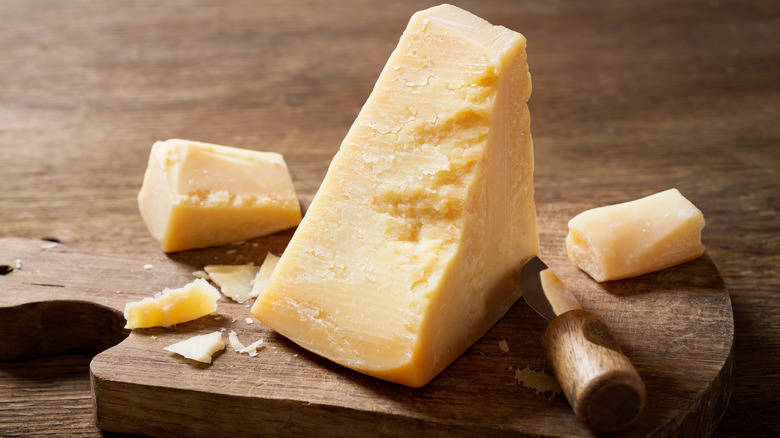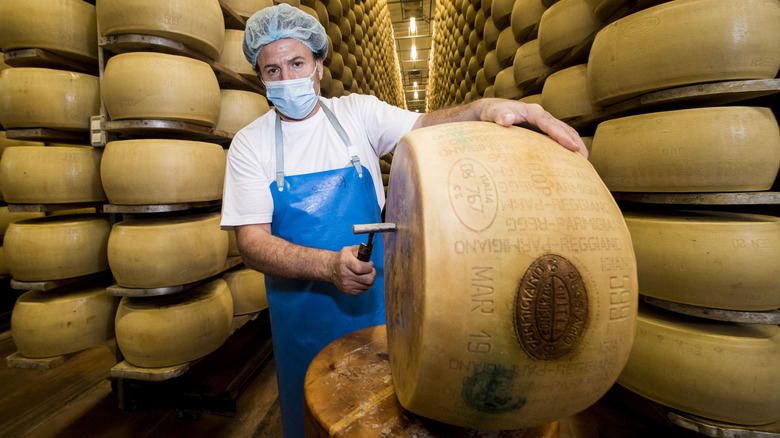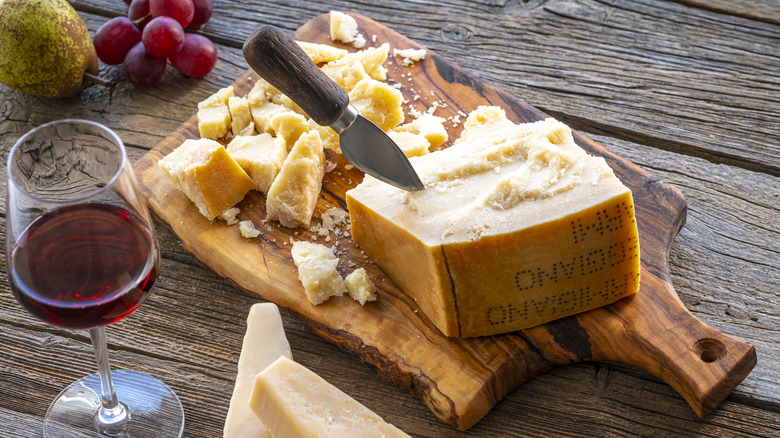Costco's Parmigiano Reggiano Is Way Better Than You May Think
It's one of the best known cheeses in the world and for good reason. It's rich and nutty, adding a deep and complex umami flavor to everything it touches. Real Parmigiano Reggiano is approximated by various "parmesan" cheeses but never truly duplicated. And with its tightly regulated standards of production and regionality, it can be expensive.
Given all that, it's pretty wild that Costco sells whole wheels of the stuff for $949.99. That price tag might seem steep to the average Costco shopper, who goes into the warehouse for amazing deals on bulk buys, like almond flour, and food court items, like hot dogs and rotisserie chickens. But even with the hefty cost, it's a good deal for someone who's going to actually use the whole wheel. If you're not about to use up all 72 pounds of the cheese, however, it might instead be worth it to grab a smaller, cheaper wedge of it next time you're cruising the Costco aisles. With its Denominazione di Origine Protetta (D.O.P.) designation and noted 24 months (or more) of aging, you can be confident that Costco's parmesan is the real deal (and as such, really delicious).
What's so special about Parmigiano Reggiano?
At a standard grocery store, you'll find tubs, wedges, and bags of parmesan. Sometimes, you'll also encounter a cheese (maybe even right next to the parmesan) that is way pricier and boasts an Italian label reading "Parmigiano Reggiano." Real-deal Parmigiano Reggiano has to meet very tightly controlled regulations to even be called Parmigiano Reggiano and then sold as such. The cheese, made from skimmed cow's milk, must be made in one of five Italian provinces and aged a minimum of two full years. At the 12-month mark, every single wheel of cheese is inspected by a master cheese grader from Il Consorzio del Formaggio Parmigiano Reggiano, the controlling body of Parmigiano Reggiano cheese.
Parmesan, on the other hand, is cheese made in the style of Parmigiano Reggiano that doesn't meet those qualifications. Maybe it's from a different region, or maybe it's aged for fewer than 12 months. It probably wasn't hand-inspected by a certified master cheese grader, either.
Because of these differences, parmesan often doesn't carry the same depth of nutty flavor or have the same salty, crystalline texture that Parmigiano Reggiano does. It's not impossible — if a cheese producer dedicates themself to producing the best Parmigiano Reggiano-style cheese they can, it may stand up to a taste test. But unless it meets all the criteria, it can't rightfully be called Parmigiano Reggiano. And, honestly, most parmesan cheeses almost never qualify. But Costco's version does.
Costco's Parmigiano Reggiano is a tasty deal
The primary way Parmigiano Reggiano is described, taste-wise, is "nutty" and "salty." The saltiness starts to develop as the cheese ages into maturity; before 18 months of aging, the cheese tends to have a sweeter milkiness with notes of fresh fruit. A Parm aged 24 months, like Costco's, has developed a more savory flavor; it builds on the fruity notes with hints of nuts and meats.
Costco's cheese wedges are $11.49 per pound. People go to Costco for a deal, so the question is: How good is that price? Based on data from CLAL, an Italian Dairy Economic Consulting firm, the average retail price for a pound of Parmigiano Reggiano as of January 2023 was around $10. In the United States, BJ's sells its D.O.P. 24-month Parmigiano Reggiano for $12.99 per pound, and Whole Foods sells its version for roughly $22.99 per pound. Taking into consideration import costs and competitor prices, Costco's Parmigiano Reggiano appears to be quite the deal.
Although perhaps best eaten in chunks drizzled with aged balsamic vinegar, Parmigiano Reggiano is an excellent grating cheese. Make cacio e pepe (cheese and pepper pasta) with it, and try adding parmesan to the pasta before the sauce. Grate it over asparagus or a radicchio thyme Caesar salad. And once you've finished the wedge, don't throw away the rind; it's the ingredient restaurant chefs swear by for flavorful sauces.


